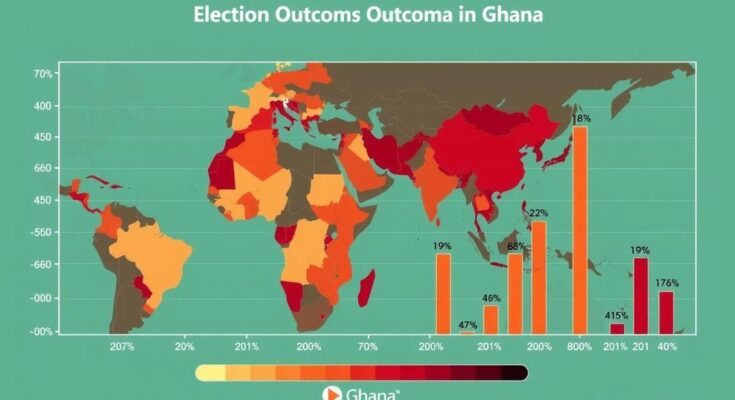The 2024 elections in Ghana saw the ruling New Patriotic Party (NPP) ousted by the National Democratic Congress (NDC) led by John Mahama. The defeat was largely due to widespread public dissatisfaction over the state of the economy, corruption allegations, and a general cost of living crisis. High inflation and unemployment rates were key issues for voters, leading to diminished support for the ruling party. The election results signify a critical political shift, with implications for both governance and the broader regional political landscape.
In the recent 2024 elections, Ghana experienced a significant political shift as the ruling New Patriotic Party (NPP) was defeated by the opposition National Democratic Congress (NDC), led by former President John Mahama. This election marked a pivotal moment in the country’s democratic process, as no party had previously held power for more than eight years since the inception of the Fourth Republic in 1992. NPP’s slogan “break the eight” aimed to establish a record, but widespread economic dissatisfaction among the populace ultimately led to their downfall.
The economic landscape played an essential role in shaping voter sentiment. For the past few years, Ghanaians have been grappling with soaring inflation, rising unemployment, and a general cost of living crisis, attributed to several global and local factors. Political analysts, such as Mussa Dankwah, emphasized that the state of the economy heavily influenced the electorate’s decision, with many feeling that the government had failed to adequately address their grievances. Surveys leading up to the election indicated strong public support for the opposition, revealing deep discontent with the ruling party’s performance.
During the campaign, the NPP sought to highlight initiatives such as the free senior high school policy and advancements in digitalization as accomplishments. However, many voters voiced a preference for tangible support regarding essential needs such as food and housing rather than these broader economic initiatives. Consequently, the NPP’s attempts to focus on long-term projects, including the construction of 111 hospitals and the controversial national cathedral project, failed to resonate with the electorate in light of their immediate economic struggles.
Public dissatisfaction was further exacerbated by perceived corruption within the government, where numerous allegations surfaced regarding mismanagement and nepotism. The opposition seized upon these sentiments, positioning themselves as the advocates for change and accountability. Notably, as the election results rolled in, it became apparent that high-profile ministers within the NPP were also voted out alongside the party’s overall decline in parliamentary representation, suggesting a significant loss of confidence in the ruling party.
Overall, the 2024 elections signal a critical juncture for Ghana’s political landscape, emphasizing the power of economic conditions and public sentiment in democratic processes. With implications for future governance, the NDC’s victory may not only lead to changes in policy but also represent a broader trend of diminishing authority for ruling parties across the African continent, reflecting similar outcomes observed in nations such as Botswana, Mauritius, and Senegal this year.
The 2024 Ghanaian elections have highlighted the dynamic nature of parliamentary democracy within the country, where the ruling party has experienced a noteworthy defeat after a long-standing tenure in power. The political atmosphere has been shaped by various factors, chiefly the economic challenges faced by citizens and discontent with governmental policies. As public trust in the ruling New Patriotic Party (NPP) eroded, the path was paved for the opposition National Democratic Congress (NDC) to reclaim power under John Mahama. This election is historically significant, representing the first instance that the NPP has failed to extend its rule beyond eight years since Ghana’s Fourth Republic began in 1992.
The outcome of the 2024 elections in Ghana serves as a wake-up call to ruling parties, emphasizing that in a democratic setting, public sentiment driven by economic realities cannot be overlooked. The NPP’s defeat reflects widespread dissatisfaction with governance, amidst economic hardships, corruption allegations, and failed promises. As the NDC prepares to take office, the changing political landscape poses questions about how future policies will address the pressing issues that led to the electorate’s decision. This election reiterates the important lesson about the role of economic performance in political legitimacy, not only in Ghana but across the African continent.
Original Source: www.bbc.com




